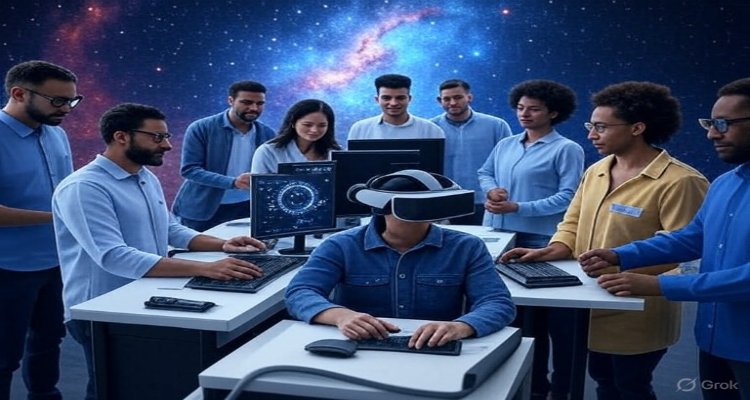Code to Cosmos: Technology Expanding Human Horizons

From AI in space exploration to quantum computing, discover how technology is bridging code and cosmos, reshaping human horizons and cosmic ambitions.
Introduction (Hook)
From the circuitry of microchips to the vast expanse of galaxies, humanity’s journey has always been tied to discovery. Today, technology is no longer confined to laboratories and factories—it is the bridge taking us from code to cosmos. What began with the flicker of early computers has evolved into artificial intelligence, quantum computing, and space exploration, reshaping how we see ourselves and our place in the universe.
Context & Background
The 20th century marked the dawn of the digital revolution, with computing power accelerating faster than anyone could predict. Moore’s Law, once a guiding principle, hinted at exponential progress—but reality has often surpassed it.
Meanwhile, space exploration, once limited to Cold War rivalries, has entered a new era. Private companies like SpaceX, Blue Origin, and emerging global players are democratizing access to the stars, while AI-powered telescopes and data systems map galaxies at a scale unimaginable to previous generations.
This convergence of code and cosmos highlights a profound shift: the tools we once used to solve earthly problems are now redefining what it means to be human in the cosmic narrative.
Main Developments
Recent years have witnessed breakthroughs at the intersection of software, computation, and space science:
- Artificial Intelligence in Space: AI is now guiding rovers on Mars, autonomously analyzing soil samples, and helping identify exoplanets from telescope data. NASA’s Perseverance rover uses AI to navigate and explore, while machine learning algorithms have confirmed thousands of new planets.
- Quantum Computing: Researchers envision quantum systems capable of simulating cosmic phenomena—from black hole physics to galaxy formation—accelerating discoveries that would take supercomputers centuries to process.
- Private Spaceflight and Data Networks: Companies are building satellite constellations to connect remote regions of Earth while simultaneously laying infrastructure for interplanetary communication. SpaceX’s Starlink, for example, isn’t just an internet service—it’s a proof-of-concept for space-based networking.
- Human-Machine Collaboration: Astronauts rely on digital twins, VR simulations, and robotic assistants to prepare for long-duration missions. These technologies blur the line between the physical and digital frontier.
Expert Insight or Public Reaction
“Technology is no longer just an enabler of space exploration—it is a co-explorer,” says Dr. Maria Ortega, a theoretical astrophysicist at MIT. “We’ve reached a point where algorithms not only process data but also propose new hypotheses about the universe.”
Public excitement mirrors this sentiment. Social media eruptions follow every rocket launch, AI discovery, or new image from the James Webb Space Telescope. For many, the sense of wonder has returned—technology is seen not just as a convenience but as a compass pointing toward humanity’s next great horizon.
Impact & Implications
The fusion of code and cosmos carries both opportunities and challenges:
- For Science: Faster data analysis accelerates research, reducing decades-long projects into months.
- For Society: Global connectivity, driven by space-based systems, may shrink digital divides, but also raises questions of surveillance and control.
- For the Future of Humanity: As we build AI-powered explorers and contemplate settlements on Mars, ethical debates about autonomy, governance, and equity will only intensify.
Most importantly, this convergence underscores a fundamental truth: the search for knowledge is no longer limited to telescopes or microscopes—it’s embedded in algorithms that mirror human curiosity.
Conclusion
From code that runs our daily lives to cosmic ambitions that redefine our future, technology has become the lens through which humanity expands its horizons. We are coding not just for Earth, but for the stars—translating human imagination into cosmic exploration. The question is no longer whether technology can take us there, but how wisely we will use it when it does.
Disclaimer : This article is for informational purposes only. It does not represent official positions of any scientific institution or organization.










